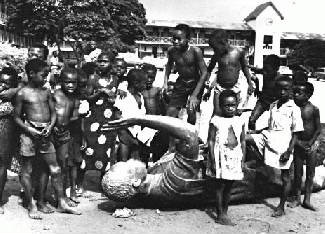Ghana 1966

Children with the toppled statue of Kwame Nkrumah after the coup d’état which deposed him
At the time of independence from Britain in 1957, the Ghanaian leader, Kwame Nkrumah, enjoyed moderately friendly relations with the U.S. However, his position on the Congo crisis of 1960 led to a noticeable chill on the part of Washington . By the early fall of 1961, Kennedy was telling one of his top State Department officials that he had “given up” on Nkrumah, who was see as having taken an “ugly lurch to the left” in both foreign and domestic policy. A short time later, Kennedy asked for a report, to be prepared “on a rush basis,” about “Ghanaian subversion in Africa”; this seems to have led to a decision to offer military training to junior officers, in addition to the “very helpful contacts” already in place with “moderate pro-Western” groups. However, at this point the chances of a coup were assessed as slim, leaving no choice for the moment but to put up with what the U.S. ambassador called “a badly confused and immature person,” i.e., Nkrumah. Such news was not welcome to top officials, who repeatedly asked the CIA about the prospects of the country's top general “to take over the government” and proposed “a well conceived and executed action program” of economic and diplomatic pressure designed to “induce a chain reaction eventually leading to Nkrumah's downfall.” The action program was approved, but, as the CIA director pointed out, the generals did not appear inclined to do anything and were, in any case, closer to the British. This made it relatively easy for Johnson to assure Nkrumah that the CIA was not “carrying on subversive activities in Ghana .”
Over the next year, the security forces, who were becoming increasingly dissatisfied with Nkrumah, were cultivated by both the U.S. and the British. By February 1965, the CIA was receiving word of coup plotting, an issue raised explicitly by the U.S. ambassador with the CIA director the next month. In May, Johnson's national security adviser was informed that a pro-Western coup by “key military and police figures” might soon break out, with the added information that the “plotters were keeping us briefed, and State thinks we're more on the inside than the British. While we're not directly involved (I'm told), we and other Western countries (including France ) have been helping to set up the situation by ignoring Nkrumah's pleas for economic aid. ... All in all, looks good.” Nothing, however, happened, which led to younger officers (the ones trained in the U.S. ) “chafing” over their superiors' failure to act. Eventually, after several more plots were put together (the CIA being duly informed of each), the military and police finally overthrew Nkrumah when he was on a trip to China . The CIA was said to have played a vital role in the coup (the station chief was promoted and given a medal) and was rewarded by the Ghanaians by being permitted (for a fee) to fly sensitive Soviet military equipment to the U.S. Following a fulsome letter to Johnson by the leader of the coup (“you can depend on me ... to support your democratic principles. ... following your example, we can re-educate our children to admire the glories of real democracy. ... I look forward to keeping you informed personally ...”), aid began to flow and, as we saw in chapter three of the book, the country become a full-fledged U.S. client.1
1) Kennedy in conversation with Ball, 21 September 1961; Rostow to Kennedy, “The Volta Project,” 2 October 1961; Office of West Coast and Malian Affairs, State Department, “Ghanaian Subversion in Africa,” 12 February 1962; NSC paper, “Ghana: Assessment Since Volta,” 13 June 1962; Mahoney in conversation with Kennedy, 19 November 1963; all FRUS 1961-1963 , vol. 21: docs. 232, 235, 244-5, 253; also docs. 230-1, 234, 246-7; Rusk in discussions with McCone, 6, 11 February 1964, in McCone, memorandum for the record, 11 February 1964; Trimble to Williams, 11 February 1964; Johnson letter to Nkrumah, in State to Accra, 17 March 1964; Komer to Bundy, 27 May 1965; memorandum for Helms, “Recent OCI Reporting on Ghana,” 25 February 1966; Ankrah to Johnson, 24 March 1966; all FRUS 1964-1968 , vol. 24: docs. 236-7, 246, 253, 257, 261; also docs. 238, 248-9, 251-2, 256; Stockwell (1978: 84, 201n); “C.I.A. Said to Have Aided Plotters Who Overthrew Nkrumah in Ghana ,” New York Times 9 May 1978; Gleijeses (2002: 133); Boateng (2002). The 1964-1968 FRUS volume has only a small number of CIA documents, and no documents from any source for the key periods of April 1964 to March 1965 and November 1965 to February 1966.
